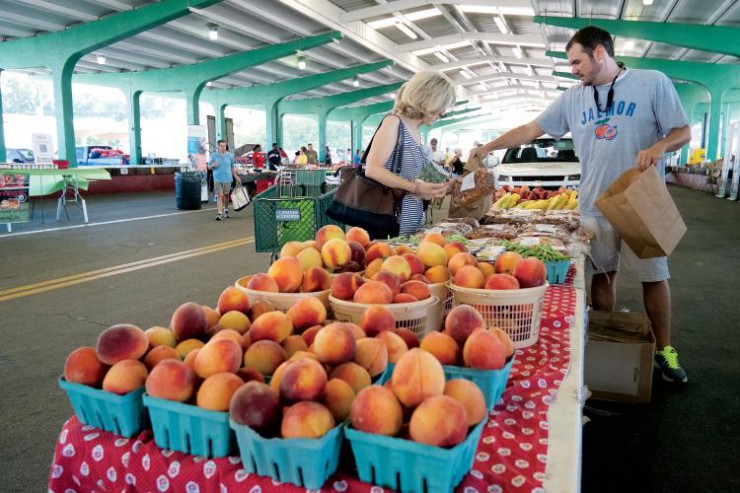Home > Georgia > Georgia Farm to Table > Georgia Farmers Markets Cater to Their Community
Georgia Farmers Markets Cater to Their Community

Need a watermelon at 2 a.m.? There’s a Georgia farmers market that’s still open and ready to accommodate.
“Our farmers markets are open 24/7, 364 days a year,” says Jack Spruill, director of the Marketing Division for the Georgia Department of Agriculture. “We only close the gates on Christmas Day.”
And once inside the gates of those nine state-operated farmers markets, you will find a cornucopia of fruits and vegetables, as well as garden centers, restaurants and even welcome centers and USDA service centers for farmers.
These markets, however, aren’t your typical side-of-the-road produce stands.
The Atlanta Market spans 150 acres, considered one of the largest of its kind in the world.
“Georgia farmers markets are an oddity” Spruill says. “We have nine in the state – there used to be 31. They’re the property of the Georgia Department of Agriculture. And we have a totally different perspective on farmers markets than a local market or the church yard or the county extension market.”
The state farmers markets – with locations in Atlanta, Augusta, Macon, Savannah, Thomasville, Cairo, Cordele, Moultrie and Valdosta – are actually small-business incubators, helping small businesses become larger, Spruill says.
“The state farmers markets were formed with an attitude. We don’t try to hold them to conventional standards – that’s not the goal,” he says. “They’ve almost evolved into what can they do for that community.”
Some of the state-owned farmers markets, like the one in Atlanta, cater to wholesale customers, supplying produce to restaurants and grocery stores. Others are more a retail market or packing-shed type of market.
“We are trying to revitalize the farmer presence,” Spruill says. “We’ve always been farmer-friendly, but we’re battling a perception that it’s only a wholesale distribution point.”
Because of that, the Department of Agriculture recently instituted farmer showcase events to bring farmers closer to consumers.
Larry Grier of Atlanta is one of the farmers who participates in the Atlanta Farmers Market, selling both wholesale and retail. He raises all kinds of peas, watermelon and sweet corn.
“I used to plant peanuts, but I gave that up several years ago,” Grier says. “This is much more labor-intensive, but it doesn’t cost as much for inputs, so it’s better.”
His black-eye and pink-eye peas are the most popular.
“I try to raise what people want,” he says. “I do some organic. Most of the time I sell to a lot of grocery stores, but I sell the same price to everyone – consumers or stores.”
The markets have become tourist attractions as well.
“Like the San Joaquin Valley in California, Georgia is the breadbasket for produce,” says Spruill. “In Metro Atlanta, between the wholesale grocery chains buying their produce at the farmers markets to chains like Applebee’s, chances are if you eat in a restaurant or buy from a grocery store, it’s likely that 90 percent of that produce came from the market.”
The Atlanta Market is even serviced by trains and trucks.
“It’s a huge business,” Spruill says. “If a farmer gets in the market, they usually don’t leave. We don’t have an escape plan for them. Right now, the Atlanta market is 100 percent occupied with a waiting list, and has been for years.”



